Grace Lutheran Church Grace Lutheran Church, Brenham, Texas, Blesses
Grace Lutheran Church, Brenham, Texas, Blesses Concordia Lutheran Mission with Vestments, Paraments, and Altar Pieces.
3 April 2007.
Grace Lutheran Church, Brenham, Texas, blessed Concordia Lutheran Mission with vestments, paraments, and altar pieces. These chancel ornaments were dedicated on the Fourth Sunday in Lent, 18 March 2007 (see photo of some of the chancel ornaments in front of some of the members of Concordia).
The Rev. Matthew Jacobs with the assistance of the Altar Guild at Grace sought out Concordia after our needs were communicated to Lutheran Mission Alliance in Texas. Thanks also to the Rev. Al Loeschmann and the Rev. Warren Malach for helping us make the connection.
The vestments and paraments cover all the seasons of the church calendar and represent thousand and thousands of dollars worth of materials were they purchased new.
Grace also provided Concordia with brass candlesticks for the altar and a brass altar cross. The cross alone is valued at nearly $500.00.
This tremendous gift of paraments, vestments, and altar pieces, blesses Concordia not only with beautiful chancel furnishings, fine trimmings, and in-kind financial assistance, but more importantly these ornaments like all ornaments and ceremonies in the church are evangelically centered because they, as our Confessions state, teach us what we “need to know of Christ” (The Apology of the Augsburg Confession, Article XXIV.3, 4).
Concordia thanks the Altar Guild of Grace, the Rev. Matthew Jacobs, all the members of Grace Lutheran, Brenham, TX, the Rev. Al Loeschmann and the Rev. Warren Malach for the gifts which benefit Christ’s Church and redound to our Savior’s everlasting glory.
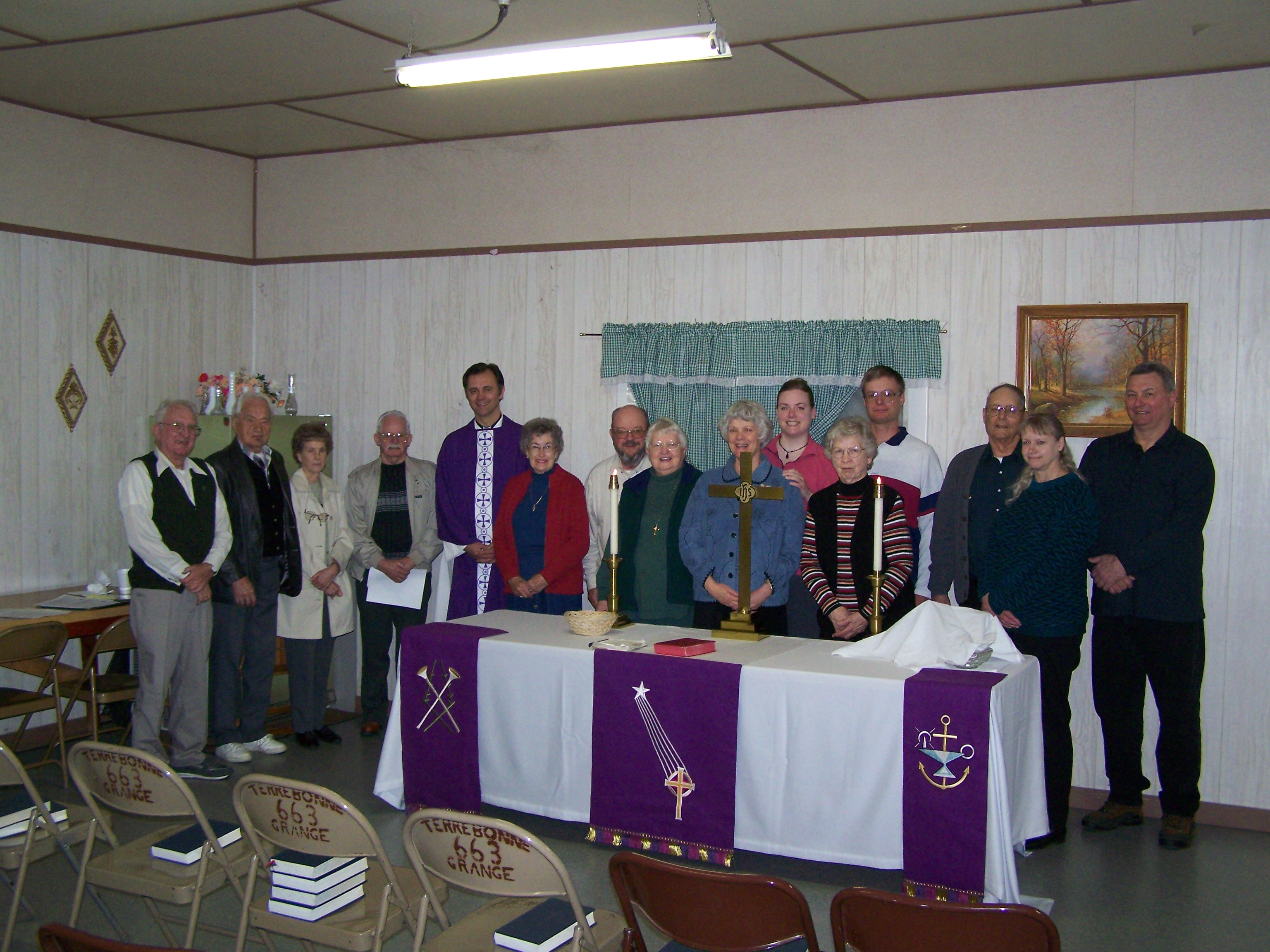
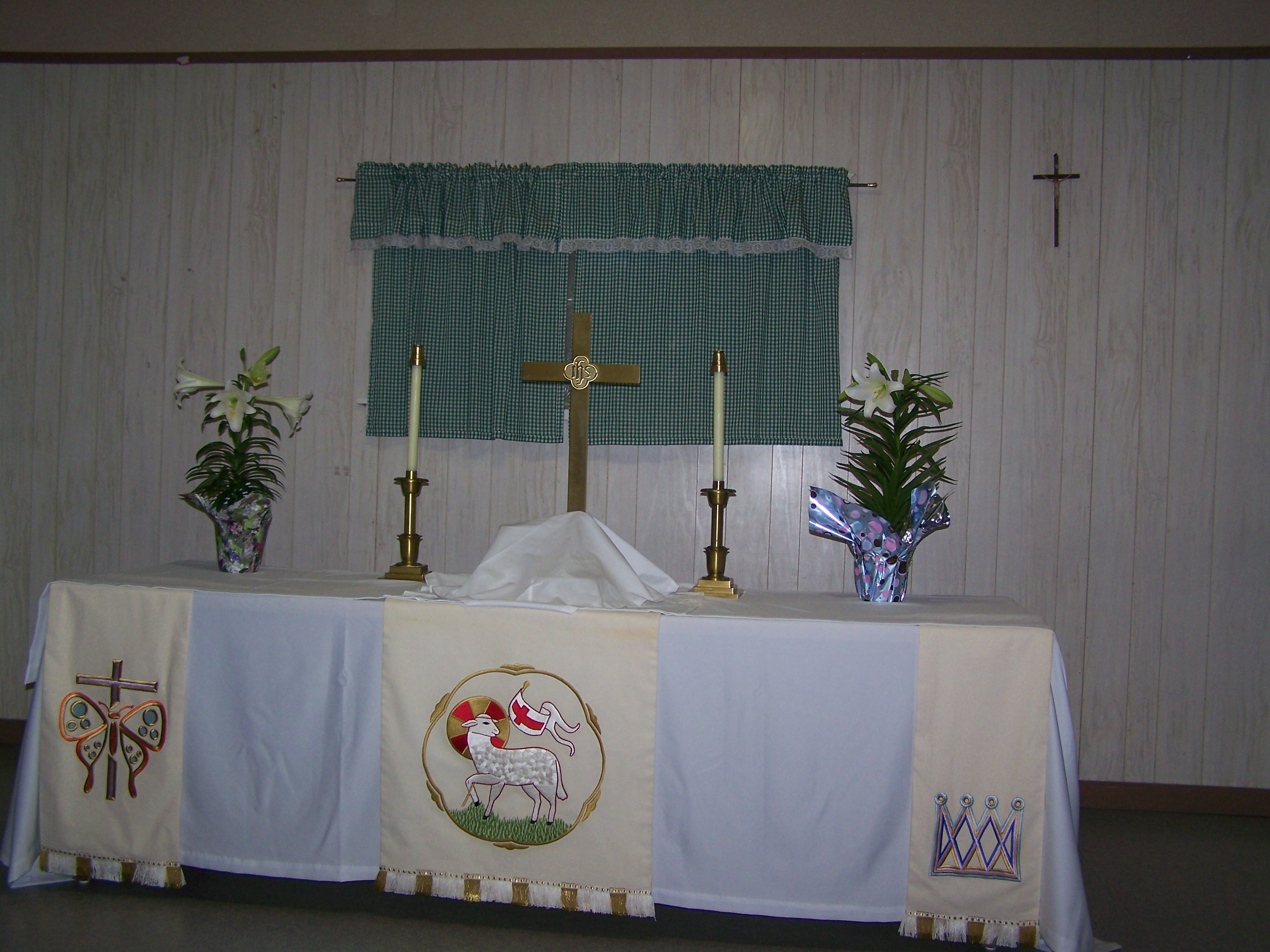
|
|
Concordia Lutheran Mission Ad in Local Newspaper
Concordia Lutheran Mission
The mission of the Church is to forgive sins
through the Gospel and thereby grant eternal life.
(St. John 20:22-23, Augsburg Confession XXVIII.8, 10)
Concordia Lutheran Mission currently meets at the Terrebonne Grange Hall,
8286 11th St., Terrebonne, OR.
web site: http://www.lutheransonline.com/concordialutheranmission
Divine Service 11:00 AM. Sunday School 10:00 AM.
The Rev. Willis C. Jenson, supply pastor, Office: 541-325-6773
Concordia Lutheran Mission States Mission of Church in Redmond Spokesman Ad.
3 April 2007.
Concordia Lutheran Mission began running an ad (see graphic above) in the Redmond, Oregon Spokesman, a weekly paper last week (28 March 2007). The ad states the mission of the Church: “The Mission of the Church is to forgive sins through the Gospel and thereby grant eternal life.”
Jesus establishes the Church’s mission when He says, “As my Father hath sent me, even so send I you. And when he had said this, he breathed on them, and saith unto them, Receive ye the Holy Ghost: Whose so ever sins ye remit, they are remitted unto them ... .” St. John 20:21, 22, 23.
Jesus commissions the Church to forgive sins because sin is what closes heaven to men (Psalm 69:4, Psalm 22:1) and bars eternal life to them (Romans 6:23).
And Jesus authorizes and empowers the Church to forgive sin not according to the whims of the Church, but rather according to His command and Word (St. Matthew 28:19, “teaching them to observe all things whatsoever I have commanded you ... .”). For the Gospel of forgiveness is for all men (St. Mark 16:15) because Jesus was given by God to save all men (St. John 3:16. “For God so loved the world that He gave His Only-Begotten Son ... .”).
And because the Church’s absolution in the Gospel is none other than Christ’s absolution (St. Luke 10:16, “He that heareth you hearthe me.”), the Lutheran Church therefore has since the Reformation (approaching ½ a millennia, i.e. 500 years) confessed the Biblical truth that the Church grants eternal life through the preaching of Christ’s Gospel:
This power [of the keys] is exercised only by teaching or preaching the Gospel and administering the Sacraments, according to their calling, either to many or to individuals. For thereby are granted, not bodily, but eternal things, as eternal righteousness, the Holy Ghost, eternal life. These things cannot come but by the ministry of the Word and the Sacraments, as Paul says, Rom. 1, 16: The Gospel is the power of God unto salvation to every one that believeth. Therefore, ... the power of the Church grants eternal things, and is exercised only by the ministry of the Word ... . (The Apology of the Augsburg Confession, Article XXVIII.3, 4)
|
|
Bethlehem Lutheran Church, Mason City, Iowa, and St. Peter Lutheran Church, La Grange, Missouri, Contribute Altar Books and Missal Stand to Concordia
Bethlehem Lutheran Church, Mason City, Iowa and St. Peter Lutheran Church, La Grange, Missouri Contribute Altar Books and Missal Stand to Concordia
31 December 2007
Bethlehem Lutheran church, Mason City, Iowa, and St. Peter Lutheran Church, La Grange, Missouri, graciously donated to Concordia Luther Mission a missal stand and altar books, The Lutheran Agenda and The Lutheran Lectionary. They were dedicated on the Fourth Sunday in Advent, 23 December 2007, during the Divine Service.
The altar books, of course, contain the Liturgy of the Church. This fact makes these books especially precious because the Liturgy of the Church is the Gospel.The Lutheran Church's position on the Liturgy since the Reformation states: "But let us speak of the word liturgy. This word does not properly signify a sacrifice, but rather the public ministry, and agrees aptly with our belief, namely, that one minister who consecrates tenders the body and blood of the Lord to the rest of the people, just as one minister who preaches tenders the Gospel to the people, as Paul says, I Cor. 4, 1: Let a man so account of us as ministers of Christ and stewards of the mysteries of God,i.e. of the Gospel and the Sacraments. And 2 Co., 5,20: We are ambassadors for Christ, as though God did beseech you by us; we pray you in Christ's stead, Be ye reconciled to God. Thus the [liturgy] agrees aptly with the ministry." (The Apology of the Augsburg Confession, Article XXIV. (XII) 80 81).
Obviously the altar books, then, are great treasures because within them reposes the saving Liturgy of the Church. And the missal stand, upon which these books rest, reflects the rich treasures of the Kingdom of Heaven which lie within those books.
The missal stand Concordia received from St. Peter is a solid brass, ornate bookstand with a bell-shaped base and adjustable easel. Its gold color and rich texture reminds us of the wealth of the Kingdom of Heaven. Brass's durability reminds us of the enduring and eternal nature of the Kingdom of Heaven.
The treasures given to us in the Gospel are not fleeting, but enduring and eternal. Jesus says in Proverbs 8: "Riches and honour are with me; yea, durable riches and righteousness. My fruit is better than gold, yea, than fine gold; and my revenue than choice silver. I lead in the way of righteousness, in the midst of the paths of judgment: That I may cause those that love me to inherit substance; and I will fill their treasures." (vv. 18-21)
The fact that a missal stand supports the liturgy reminds us that all things in the Church are appointed to teach people what they need to know about Christ and the eternal benefits He bequeaths us in the Liturgy. The Large Catechism states: "Everything, therefore, in the Christian Church is ordered to the end that we shall daily obtain there nothing but the forgiveness of sin through the Word and signs, to comfort and encourage our consciences as along as we live here." (Part Second, the Creed, Article III.55). And The Augsburg Confessionstates: "For ceremonies are needed to this end alone that the unlearned be taught [what they need to know of Christ]." (Article XXIV. 3, 4)
Concordia again extends its heartfelt thanks and expresses its deep appreciation for the rich gifts bestowed upon us by Bethlehem Lutheran Church and their Pastor the Rev. Mark Lavrenz and St. Peter Lutheran Church and their Pastor the Rev. Paul Lohse.
Soli Deo Gloria.
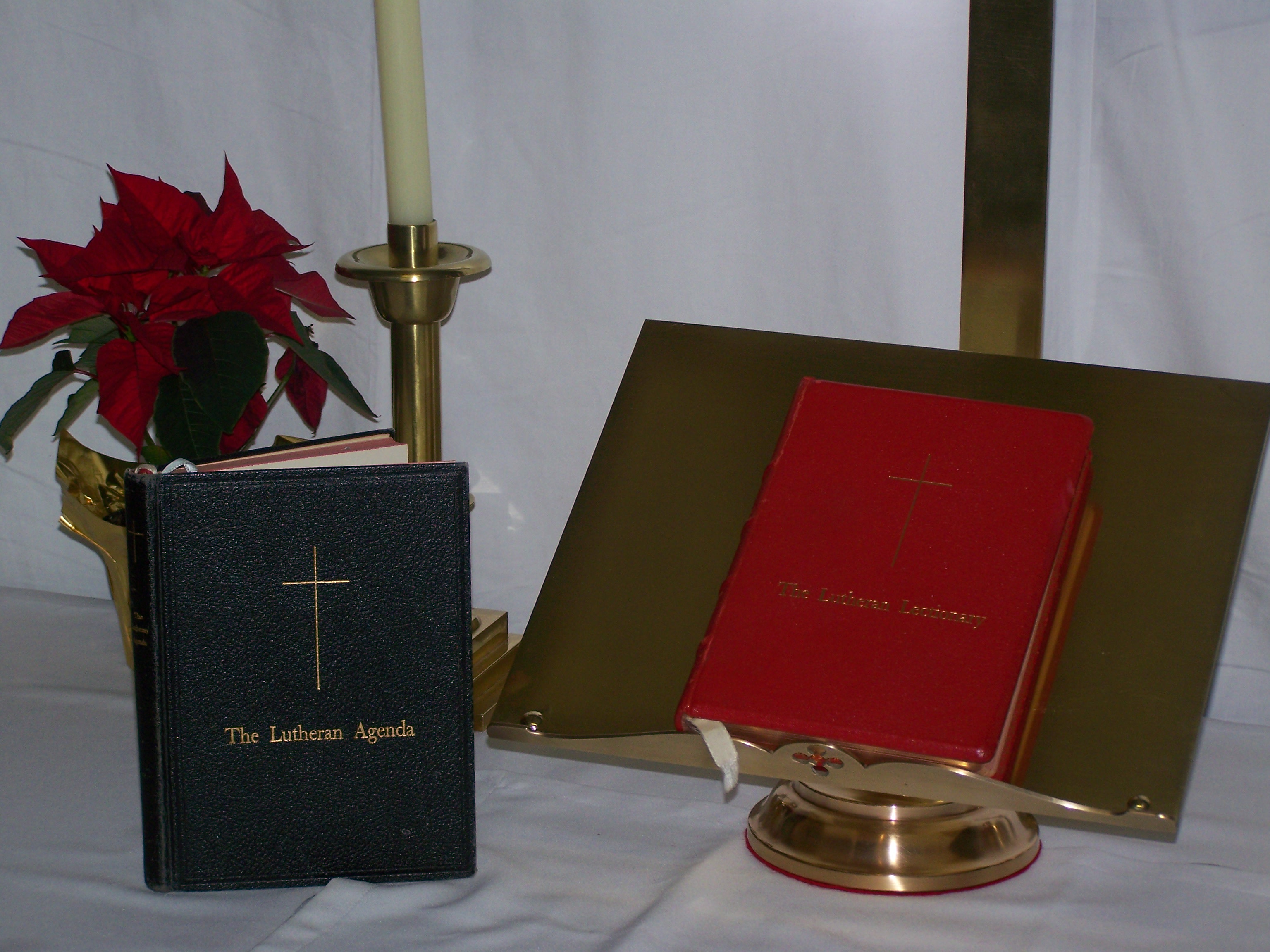
"MISSAL: 1) the Roman service book containing the Ordinary and the Canon of the Mass and the proper's of the time and of the saints; 2) in modern use, a large edition of the service book, well bound, intended for use at the altar.
"MISSAL STAND: the desk of metal or wood upon which the service book rests on the altar in time of public worship." Luther Reed, The Lutheran Liturgy, p. 768 |
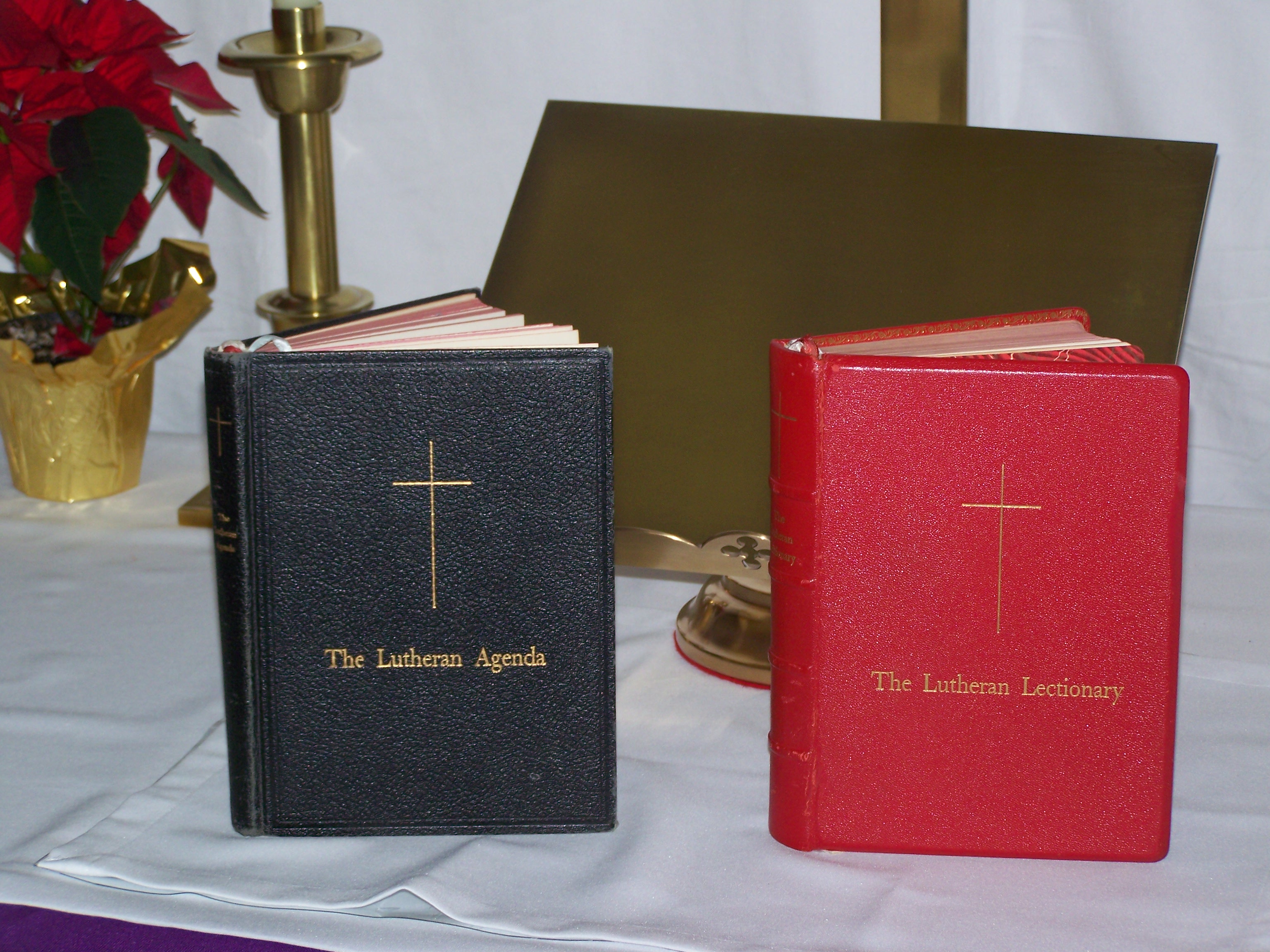
The Altar Books, The Lutheran Agenda, and The Lutheran Lectionary, on the altar of Concordia Lutheran Mission. The Altar Books were donated by Bethlehem Lutheran Church, Mason City, Iowa
The Rev. Mark Lavrenz, Pastor
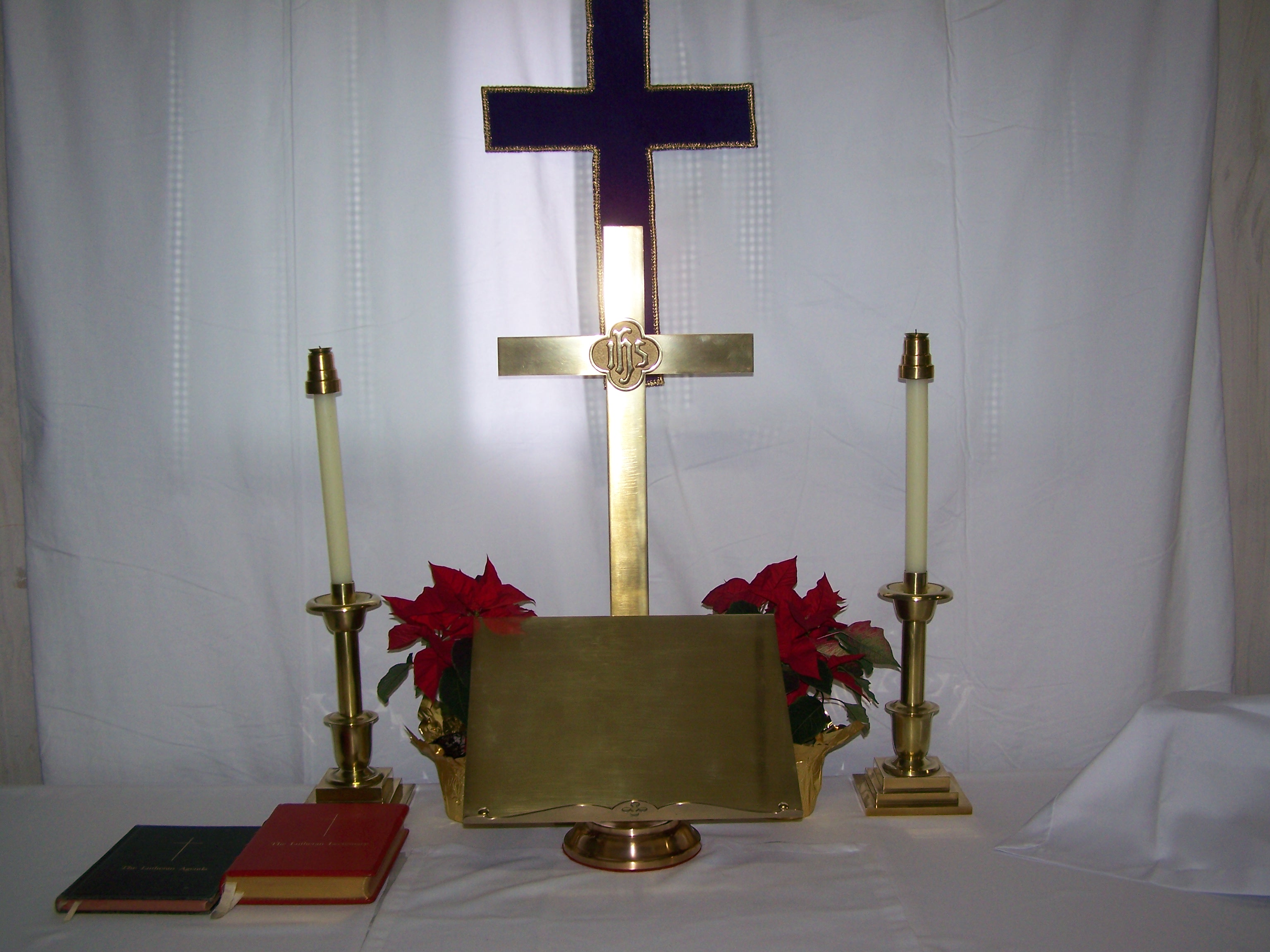
The Missal Stand on the altar of Concordia Lutheran Mission. The Missal Stand was donated by St. Peter Lutheran Church, La Grange, Missouri
The Rev. Peter Lohse, Pastor
|
|
|
Concordia Dedicates White Chasuble
Concordia Dedicates White Chasuble to the Service of Christ's Church and to God's Eternal Glory.
On the Third Sunday in Advent, 14 December 2009, Concordia Lutheran Mission dedicated the white chasuble sewn and handcrafted for Concordia by Concordia member Mrs. Betty Kuk. The chasuble
completes Concordia's set of vestments. The chasuble includes a stole and is made of white cloth with gold Maltese crosses on the front and back of it.
Mrs. Kuk selected the material and cut it to fit after the pattern of Concordia's other chasubles. Once the material was cut to the pattern, she then assembled it by sewing together the various components.
The last part of the project was to affix the cross appliqués. The appliqués for chasuble and stole were handcrafted for Concordia by nuns from Immaculate Heart Convent of Syracuse, New York.
"... the alb, stole, and chasuble are the primary eucharistic vestments of the Church of the Augsburg Confession ... ." Lutheran Worship: History and Practice, p. 223. The chasuble makes plain that the emphasis lies on the Office of the Gospel, which the pastor administers, and not the pastor. For the chasuble, like all vestments, draws the attention of the faithful to the Office of the Gospel in the Crosses and other symbols that appear on the chasuble, and not to the person of the pastor. This vestment, like all other vestments, brings into bold relief not the person of the pastor but rather the saving Person of Christ in the Word and the Sacraments:
"For Luther, vestments belong within the realm of Christian liberty. In his Formula Missae of 1523 he commented, 'We permit them [vestments] to be used in freedom, as long as people refrain from ostentation and pomp. For you are not more acceptable for consecrating in vestments. Nor are you less acceptable for consecrating without them.' ... Luther's colleague and pastor, Johannes Bugenhagen, expressed a similar view in a letter to a certain M. Goerlitz on September 30, 1530: 'There is a twofold doctrine of chasubles ... one is the truth, namely that chasubles can be used; this does not give scandal to those who are accustomed to hearing the Gospel. The other is a Satanic lie out of the doctrines of the devils, namely, that it is never lawful to use chasubles; this gives scandal to the people where they hear and believe such lies from the ministers.' ... The Lutheran Church – Missouri Synod has wisely sought to follow the directive of Article XXIV of the Apology that vestments are retained in the church's liturgy. The continued use of vestments in the Church of the Augsburg Confession is important for at least two reasons: First, vestments are used as ensigns of the office of the holy ministry. These liturgical garments cover the man, reminding the congregation that their pastor speaks to them not simply as a fellow Christian, but as 'a called and ordained servant of the Word.' The vestments are clothes of a servant. In this sense, ... 'vestments are a liturgical language.' Secondly, vestments are a visual reminder of the continuity of the church's worship throughout history. Grisbrooke writes, 'An essential element in the nature of Christian worship is its witness to the unchanging and abiding value and power of God's mighty works in Christ, and it follows that the vestments should reflect the continuity of Christian worship, rather than discontinuities which times have afflicted it.' ... The use of the historic vestments signals our linkage with the church catholic in confession and life. Thus in the evangelical Lutheran Church vestments are not merely aesthetic decorations, but are symbols of the historic continuity of our church with prophets, apostles, martyrs, and confessors of all times and places." Lutheran Worship: History and Practice, pp. 221, 222, 223, emphasis added.
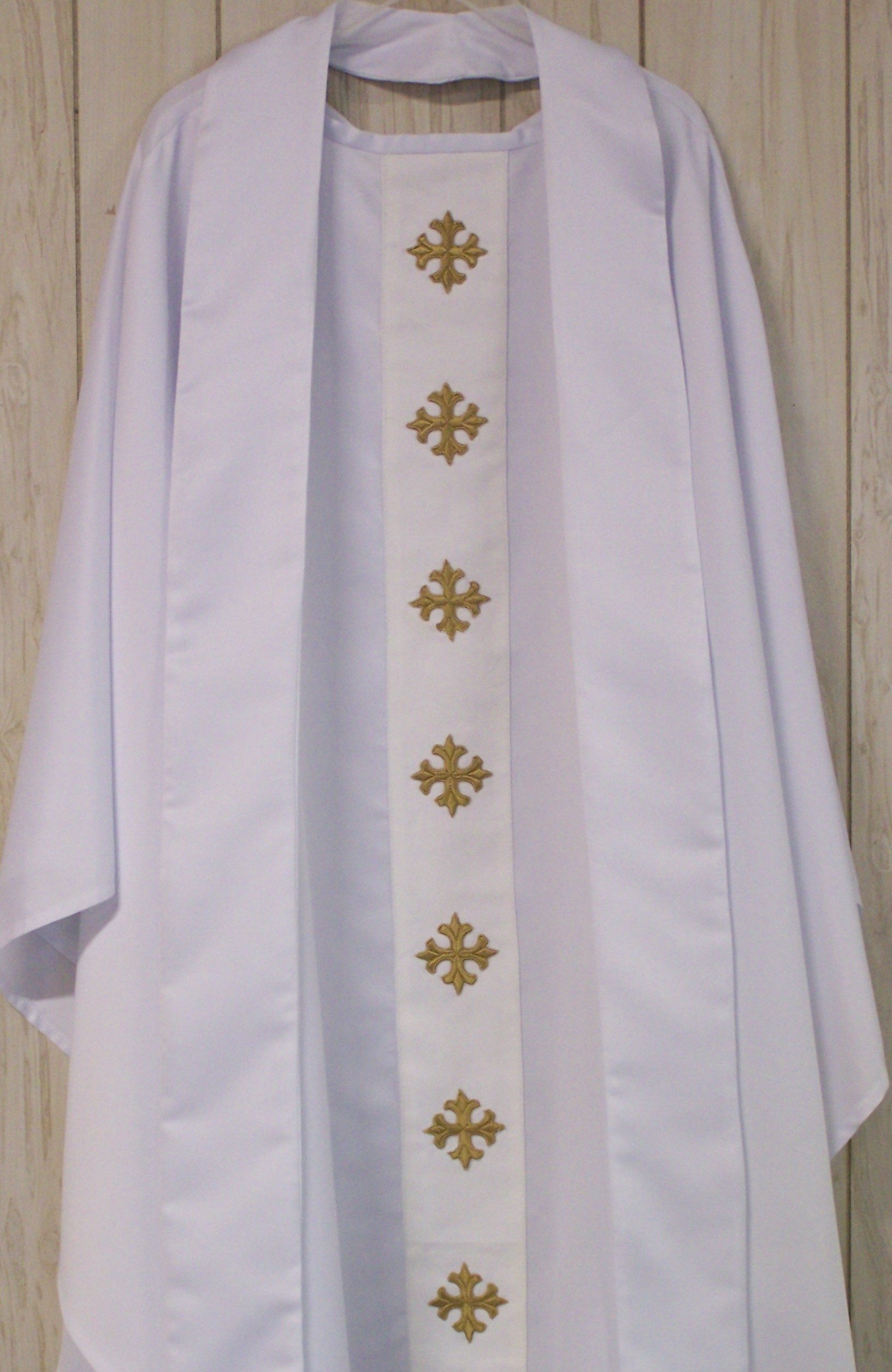
|
|
|